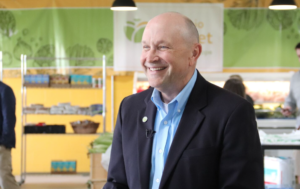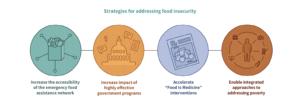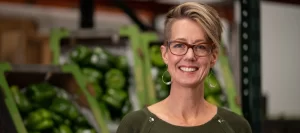Regi Young, the new Executive Director of Alameda County Community Food Bank, got into food banking after working in community organizing, and remembers being impressed by the resources food banks had and the large number of communities they were in.
It also struck him that food banks could have greater impact by being more thoughtful about which communities they served and why.
“I thought it was possible to be very deliberate about who you send food to, how you deliver it, and what food you send, and have certain impacts that would be better aligned with the goals of the community,” said Young, who came to ACCFB this month after 11 years at Houston Food Bank where he served most recently as Chief Strategy Officer.
Food banking that puts community members at the center of the work will be Young’s focal point as he takes over from Suzan Bateson, who is transitioning out of the top position at ACCFB after 20 years. He sees ACCFB, with its reputation of being at the forefront of social justice, as an ideal place to carry out his mission.
“ACCFB is very deliberate in wanting to be transformational in the way it connects to community members,” he said. “We’re looking to build upon that foundation to see how we can hyper-drive that goal.”
ACCFB staff members are already well aware of the need for community engagement, Young said, relaying that one of his new colleagues told him the food bank’s job is not about talking on behalf of people or even lifting up their voice, but about empowering them.
“I buy into that,” Young said. “We need to place our community members in front. They lead, we support.”
ACCFB’s emphasis on working with community stakeholders puts it at the head of a growing trend of food banks seeking to deepen ties with community groups. At the Greater Chicago Food Depository, for example, a new relationship with a community-focused anti-violence group quickly morphed into the food bank’s largest partner in Chicago, now distributing to 10,000 families a week.
In 2005, ACCFB was at the forefront of another trend when it became the first food bank in the nation to ban the distribution of sugar-sweetened carbonated beverages. Bateson replaced that poundage with fresh fruits and vegetables, helping to form the creation of California’s robust Farm to Family program, which today distributes more than 160 million pounds of produce to food banks throughout the state. Bateson, who was honored in 2020 with Feeding America’s prestigious John van Hengel fellowship award, also gets credit for starting one of food banking’s first SNAP outreach programs.
After ACCFB, Bateson plans to spend time developing resources for women-of-color leaders through board and foundation support; seeing more of her grandchildren, and perhaps getting back to her early roots as an artist and graphic designer by picking up a paintbrush again, she said.
Bateson’s work at ACCFB helped set the stage for Young’s succession. “I wasn’t going to leave Houston for just any food bank,” Young said. “I really feel like this place has the assets, community support, knowledge and talent to do some great things.” — Chris Costanzo
CAPTION ABOVE: Regi Young, the new Executive Director of Alameda County Community Food Bank.
Like what you’re reading?
Support Food Bank NewsConnect with Us:










